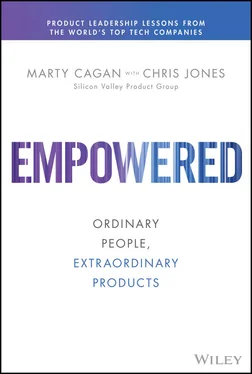"I included INSPIRED as mandatory reading for anyone joining my product development teams. Now I'll add EMPOWERED to the list of mandatory reading."
Joca Torres, CPO, Gympass
" INSPIRED has been a manual for our team to build better products. EMPOWERED is now a manual to build a stronger team. Everything I've read from SVPG is spot on, and often feels like I can use it the same day."
Ian Cairns, Head of Product for Twitter Developer Platform
" EMPOWERED is first and foremost about permission. Companies have to give themselves the permission to orient around a culture of product centricity. Everything from org structure, to technology, to culture and coaching derives from this. And nothing embodies this idea more than Marty's writings."
Punit Soni, founder, CEO, Suki
The Silicon Valley Product Group Series
INSPIRED: How to Create Tech Products Customers Love, 2nd Edition (Marty Cagan, 2017)
EMPOWERED: Ordinary People, Extraordinary Products (Marty Cagan with Chris Jones, 2021)
TRANSFORMED: Becoming a Product‐Driven Company (Lea Hickman, 2021)
LOVED: How to Market Tech Products Customers Adore (Martina Lauchengco, 2021)
MARTY CAGAN WITH CHRIS JONES
Silicon Valley Product Group
EMPOWERED
ORDINARY PEOPLE, EXTRAORDINARY PRODUCTS

Copyright © 2021 by John Wiley & Sons, Inc. All rights reserved.
Published by John Wiley & Sons, Inc., Hoboken, New Jersey.
Published simultaneously in Canada.
No part of this publication may be reproduced, stored in a retrieval system, or transmitted in any form or by any means, electronic, mechanical, photocopying, recording, scanning, or otherwise, except as permitted under Section 107 or 108 of the 1976 United States Copyright Act, without either the prior written permission of the Publisher, or authorization through payment of the appropriate per‐copy fee to the Copyright Clearance Center, Inc., 222 Rosewood Drive, Danvers, MA 01923, (978) 750‐8400, fax (978) 646‐8600, or on the Web at www.copyright.com. Requests to the Publisher for permission should be addressed to the Permissions Department, John Wiley & Sons, Inc., 111 River Street, Hoboken, NJ 07030, (201) 748‐6011, fax (201) 748‐6008, or online at http://www.wiley.com/go/permissions.
Limit of Liability/Disclaimer of Warranty: While the publisher and author have used their best efforts in preparing this book, they make no representations or warranties with respect to the accuracy or completeness of the contents of this book and specifically disclaim any implied warranties of merchantability or fitness for a particular purpose. No warranty may be created or extended by sales representatives or written sales materials. The advice and strategies contained herein may not be suitable for your situation. You should consult with a professional where appropriate. Neither the publisher nor author shall be liable for any loss of profit or any other commercial damages, including but not limited to special, incidental, consequential, or other damages.
For general information on our other products and services or for technical support, please contact our Customer Care Department within the United States at (800) 762‐2974, outside the United States at (317) 572‐3993 or fax (317) 572‐4002.
Wiley publishes in a variety of print and electronic formats and by print‐on‐demand. Some material included with standard print versions of this book may not be included in e‐books or in print‐on‐demand. If this book refers to media such as a CD or DVD that is not included in the version you purchased, you may download this material at http://booksupport.wiley.com. For more information about Wiley products, visit www.wiley.com.
Library of Congress Cataloging‐in‐Publication Data is Available.
ISBN 9781119691297 (Hardcover)
ISBN 9781119691259 (ePDF)
ISBN 9781119691327 (ePub)
COVER DESIGN: PAUL MCCARTHY
This book is dedicated to Bill Campbell (1940–2016), known with affection as the Coach of Silicon Valley .
While I had met Bill a few times over the years, I was never fortunate enough to be coached by him. However, I count myself very lucky to have been managed and coached by several leaders who were coached by Bill .
Increasingly, I realize how many of the important lessons I've learned about leadership, empowerment, teams, and strong product companies can be traced back to Bill .
I hope he would approve of this book, and that he would be proud to see his teachings living on .
PART I Lessons from Top Tech Companies
My first book, INSPIRED , discussed how strong product teams at the best product companies use the modern techniques of product discovery to solve hard problems in ways their customers love, yet work for their business.
INSPIRED brought me and my SVPG Partners into many more organizations, well beyond Silicon Valley.
The most striking thing we learned was that in so many companies—even companies trying to do true, technology‐powered products and services—product teams were too often not allowed to work the way they needed to.
We realized that it's not just the techniques that strong product teams use to discover successful products, but that the differences between how great product companies work and the rest run much deeper.
What we found in these companies was not pretty.
So many companies still have the old IT mindset when it comes to technology. It's viewed as a necessary cost rather than the core business enabler it needs to be. The people who work on the technology teams are literally there “to serve the business,” and the technology managers and leaders are there to facilitate serving the business. Or it's shoved off to the side in some “digital” business unit. The technology teams are disconnected from the real customers—in fact, they're encouraged to think of their stakeholders as their customers.
There is little if any active coaching of the people on the technology teams. And even if they wanted to coach, the managers often don't have the experience themselves. So the problems perpetuate.
Most of these companies recognize that they don't have the staff they need, but they have very misguided ideas about how to correct that, and what to look for in product staff. So again, the problems perpetuate.
These companies rarely have an inspiring, compelling product vision. They may have had one during the early years of their company, but after the founders left, the vision faded. The people on the technology teams feel like they're just working in feature factories.
The technology people are divided up into teams where they feel like they aren't responsible for anything meaningful, they can't do much without depending on changes from several other teams, and that they're just a small cog in a giant wheel.
It wouldn't be fair to say that most of these companies have a weak product strategy, because in truth, most have literally no strategy at all. They are just trying to please as many stakeholders as they can with the people and time and skills they have.
Читать дальше












